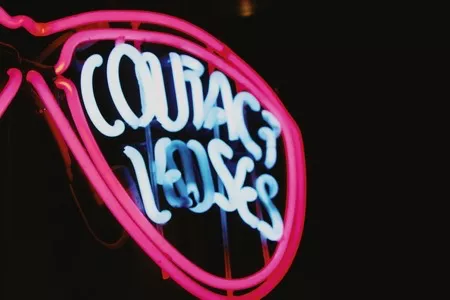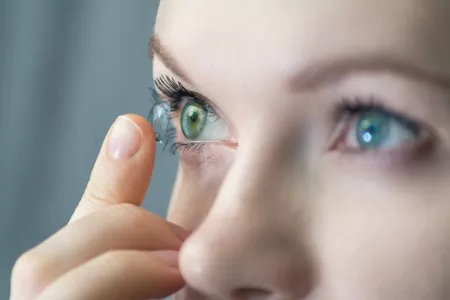Being able to see well is essential to performing the activities of day-to-day life. Find out what contact lenses or eyeglasses are best for you.
 It can be hard to figure out what works best for you if you need vision correction. Glasses and contacts are both great options that come with pros and cons. There are many factors that you must consider when choosing your vision correction device, like price, comfort, what works best for your lifestyle, and what your eyes need.
It can be hard to figure out what works best for you if you need vision correction. Glasses and contacts are both great options that come with pros and cons. There are many factors that you must consider when choosing your vision correction device, like price, comfort, what works best for your lifestyle, and what your eyes need.
Glasses can accommodate different visual needs than contacts and vice versa. If you want to know what will work best for your eyes, there are different eye tests you can take that can help you make your decision. There are many eye exams that your eye doctor may perform during appointments to assess the health of your eye. These can show what your eyes need so that you can narrow down your search. Analyzing the pros and cons for both your options can help as well.
Contact Lenses Pros
Many contact lens options can accommodate your vision needs. Contact lenses can give you more natural vision, and a natural look when you do not wear glasses frames. They move with your eye and they don’t get fogged or covered in droplets if it rains. Contact lenses also do not distort light, and they let you see without obstructions to your peripheral vision.
Contact lenses are also good for those with an active lifestyle. Once they are in your eye, you don’t have to keep track of them or worry about breaking them like you would if you were wearing glasses. Glasses are much easier to lose than contact lenses, so you can have that worry lifted off your shoulders if you wear contacts. Contact lenses are easier and cheaper to replace than a pair of glasses. If you choose to wear something like Clariti 1 Day with 90 contact lenses, your eyes can stay hydrated with silicone hydrogel. This kind of lens can keep your eyes healthy and moisturized while correcting your vision.
Types of Contact Lenses
The number of contact lens options out there can be overwhelming. There are so many different brands and kinds to choose from. These different types of lenses are placed in two categories: hard lenses and soft lenses.

Soft lenses are the most common, and are made of hydrogel or silicone hydrogel that can help hydrate the eye and keep your cornea healthy. Rigid lenses are often "toric" and less flexible, and therefore don't have as many hydration options. and less hydrating. On the other hand, hard lenses are necessary to treat conditions like astigmatism. New materials and innovations have made even hard lenses far more breathable and comfortable than they were in the past.
Besides hard and soft contact lenses, other categories separate how these lenses should be worn. There are daily, bi-weekly, and monthly contact lenses. The daily lenses can only be worn once a day, and then they are thrown away. Bi-weekly lenses can be worn for up to two weeks, and they have to be cleaned every night. There are also monthly lenses, which can be worn for up to one month (during the day only) before they have to be discarded. Monthly lenses also have to be cleaned every night in an approved lens solution.
Contact Lenses Cons
Contact lenses have many positives, but they do also have some cons. Once you know the accommodations you must meet for your eyes, you should also consider how contact lenses will fit into your daily routine. Unless you choose daily contacts, your lenses will require more maintenance than glasses. Contacts require proper cleaning and daily care, because dirty contact lenses can cause irritation, eye infections, and eye disease. Contact lenses are more likely to cause eye infections, because they require you to touch your eyes more frequently. Contact lenses can offer comfort and clear vision, but without proper hygiene, they can cause further discomfort.
It can also be difficult to choose the right contact lens brand that works with your budget. The price of your contact lenses depends on the type of lens that you choose, and what conditions you need it for. Daily contact lenses are the easiest to maintain, but they are also the most expensive. Overall, contact lenses are more expensive than prescription glasses. You do not have to buy replacement glasses unless you lose or break them, while contact lenses are a continuous cost.
Eyeglasses Pros

Prescription eyeglasses also have their positives when it comes to vision correction. There are many different forms of eyeglasses, some specifically for fashion, protection, or blocking the sun. Prescription glasses are specifically designed to improve eyesight comfortably. Glasses tend to be easier to maintain than contact lenses. They do not require daily cleaning or consistent effort to order the right lenses on a regular basis. Rather, you can simply put your glasses on and go!
You can also choose glasses that fit your style and change up your look. Your glasses can be a part of your appearance for as long as your prescription stays the same, and whenever it changes, you have a chance to pick out a new look! Glasses also don't require you to touch your eyes frequently.l. They're also easy to clean and don't risk eye infections if they get dirty. If you are looking for something easier to maintain, glasses may be for you.
Eyeglasses Cons
Eyeglasses can cause some inconvenience and may not be for everybody. If you have a strong prescription or astigmatism, your lenses are more likely to distort vision. Glasses tend to distort your field of vision around the edge of the lens, and the lens frames can also obstruct your peripheral vision. Eyeglasses may also not be comfortable for everyone to wear. They can add pressure to your nose or ears that can cause headaches in some people.
Glasses can be a great way to switch up your style, but some people don’t like the way they look in glasses. Some prefer the more natural look that contact lenses provide, and do not want to cover their face with lenses or frames. Glasses are also much more affected by the weather than contacts. Glasses fog up with temperature changes or collect raindrops that make it difficult to see. You may have to select when to wear them if you don’t like how the weather affects them, and they may not be the best choice to wear when playing sports or being active
Final Thoughts
There are many things to consider when choosing the right vision correction. Glasses and contact lenses have many positives that accommodate different eye conditions and necessities, but they may not work well for some lifestyles. Contact lenses can provide unobstructed vision that isn’t distorted, and they work well for those with an active lifestyle. There are many different contact lenses to choose from, which provides more freedom in how you want to care for your eyes. They are, however, more expensive than glasses, require more daily maintenance, and may not work for everyone's routine
 Save yourself from getting into rush hours and buy your contacts online.
Save yourself from getting into rush hours and buy your contacts online.








